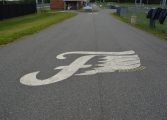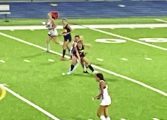The two subdivisions, and others in Fluvanna like them, were built during the housing boom of the 2000s. But when the recession hit and many developers went bankrupt, the roads – still privately owned – were left to deteriorate.
Usually either a successor developer takes over the job or money from a bond is used to complete the work necessary for VDOT to accept responsibility for the roads. But Taylor Ridge had neither a successor developer nor a bond.
Private roads come with significant drawbacks. School buses weren’t allowed to drive on the roads in Taylor Ridge or Cunningham Meadows, which forced vehicles and children to congregate at the entrances to the subdivision on busy Rt. 53.
And when it snowed no one would plow the roads, leaving residents stuck in place and worried about whether rescue vehicles or fire trucks would be able to make it through in case of an emergency.
But most of all, the private roads deteriorated under routine wear and tear – and with no one to keep the roads up, residents knew they either needed to sell their homes, if they could, or eventually foot hefty bills for repairs themselves. Several residents complained publicly about the effect the roads had on their property values and the deterring impact the situation would have on the interest of future homebuyers.
Cunningham Meadows, which has only one street, did have a successor developer, Liberty Homes, who did the work necessary to bring the roads into the system. But because Taylor Ridge had no one to turn to, the residents of the 44 homes in the community banded together and made it happen for themselves.
“We realized we needed to take some sort of action, because the roads were 10 years old and starting to deteriorate,” said Melissa Hutcherson, who along with neighbor Kate Skovira spearheaded the drive to fix the roads. “So we decided to take on the task of getting the roads turned over. We knew we’d have to incur some costs.”
First Hutcherson and Skovira went to VDOT to get an updated “punch list” of fixes required before the state would take over the roads. Then, one by one, they worked on getting the items checked off.
“We had four homeowners who had to make repairs to their own property, and all four said they were on board and would make those repairs,” said Hutcherson. Some had brick walls or mailbox posts in the right-of-way while others needed to do some gutter work.
“Then we got the paving estimate, and we went to the remaining homeowners and asked if they would be willing to contribute to the paving repairs,” said Hutcherson. “We had positive support from pretty much everyone in the neighborhood.”
When the women divided the costs of paving the streets between the homeowners, excluding the four who made more costly repairs, the total came to about $500 per household. Everyone paid their share except for a couple of homeowners in difficult financial situations, said Hutcherson.
But the kicker came when Hutcherson learned that VDOT was charging them a fee of $6,750 to accept the roads into the system. And the timing was such that the fee had to be paid quickly. So Hutcherson and her husband Tony paid the $6,750 out of their own pockets.
There was only one thing the residents of Taylor Ridge simply couldn’t do on their own. VDOT required a $50,000 surety for one year in order to take the roads into the system. Any costs incurred by VDOT for the Taylor Ridge roads within the first year of taking them over would need to be reimbursed by whoever put up the surety. And the residents simply couldn’t afford it.
So they turned to the Board of Supervisors and asked if the county would be willing to put up the surety.
At their Wednesday meeting (June 1), supervisors passed the resolutions asking VDOT to accept Cunningham Meadows and five of the six Taylor Ridge roads into the state system – one road with only two houses on it, Berry Ct., needs too much work. But putting up the surety proved to be a sticking point.
“I don’t think taxpayers should be on the hook for $50,000,” said Supervisor Don Weaver. “People always want the government to pay for some of the mistakes they overlooked when they made decisions…but I don’t think taxpayers should be responsible if it doesn’t meet VDOT standards.”
But Supervisor Tony O’Brien disagreed. “I think this is a good example of the citizens in that community taking steps that we encouraged them to take,” he said. “I think this is the right thing for our Board to do, to back this… It encourages other communities to do the same thing.”
“Does the county have some responsibility as well?” asked Supervisor Mozell Booker.
“No,” replied County Administrator Steve Nichols.
“I guarantee you’re going to spend this $50,000,” said Supervisor Trish Eager. Nichols disagreed, and Jason Stewart, planning and zoning administrator, said that the residents have been working very closely with VDOT and have taken care of the items on the punch list.
“I understand your point,” O’Brien said to Weaver, “but having homes that can’t be sold because of lack of road systems isn’t really in the county’s benefit.” He said the risk the county would bear by putting up the surety would be mitigated by the increased value to the homes in Taylor Ridge, and thus the increased tax dollars collected on those homes.
Eager asked if the county would be setting a precedent by putting up the surety. But County Attorney Fred Payne pointed out that the county actually set a precedent in 2011 when it took a similar action for the Steger Creek subdivision in Troy.
“The longer this goes without being brought into VDOT the more it’s going to cost to do,” Payne said, because roads deteriorate without lack of maintenance. “If it’s not accepted now the residents will have the same problem in a few years, and it will probably be more expensive then. If you want to have your problem solved, the time to do it is as soon as possible.”
Nichols mentioned that Needham Village, a subdivision on Lake Monticello Rd. that is often mentioned in connection with Taylor Ridge, has a bond remaining that will potentially cover the costs of bringing the neighborhood’s two roads into the state system.
Supervisors voted to put up the surety 3-2 (Weaver and Eager dissenting).
Then Nichols asked if supervisors would consider reimbursing the $6,750 VDOT fee to the Hutchersons.
“It never quits, does it?” asked Weaver. “That’s the reason we are where we are.”
“Progress never stops,” countered Booker.
Hutcherson confirmed she plans to formally request the Board to reimburse the money. “They’ll vote on it and whatever they decide – we’ll just have to wait and see,” she said.
Stewart said that the roads will be officially accepted into the state system as soon as the paperwork is processed, which he said should happen in less than a month.
“I’m relieved,” said Hutcherson about the success of her mission. “If the roads deteriorate, it would be less attractive to future homeowners. And the tax values would go down. So it benefits everyone, not just our neighborhood, by keeping the roads up.”
Hutcherson appreciated how people in Taylor Ridge pulled together to solve a problem that has lingered for years. “Everyone was cooperative. We had a great response. I just can’t thank the neighbors enough for their support,” she said. She also thanked supervisors for voting to put up the surety. “That was the final step that we needed to accomplish to get the roads turned over,” she said.




